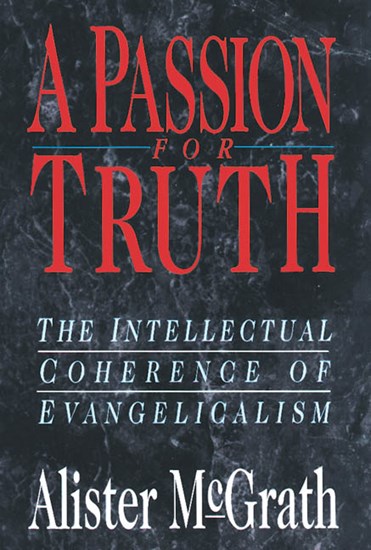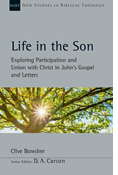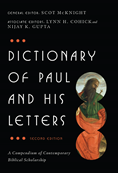
|
A Passion for Truth
paperback
|
- Length: 287 pages
- Dimensions: 6 × 9 in
- Published: July 12, 1999
- Imprint: IVP Academic
- Item Code: 1591
- ISBN: 9780830815913
-
Other Retailers:
Amazon*
*affiliate partner
- Voted one of Christianity Today's 1997 Books of the Year
Decades ago, evangelicalism was given up for dead in the academy. But since World War II, evangelical intellectualism has made a surprising comeback. Esteem has been regained especially in such disciplines as history and philosophy. Now evangelical theologians are making their bid for academic respectability.
A Passion for Truth, written by one of evangelicalism's outstanding younger theologians, seeks to show that the movement has in its heritage excellent resources to engage the scholarly debates of the day.
McGrath first sets forth the constructive ground on which evangelicalism stands, then shows how this revivified school of thought might respond to such important theological and cultural realities as postmodernism, religious pluralism and postliberalism. His book is fresh and exciting evidence that evangelicalism is coming of age.
"McGrath establishes the uniqueness of Jesus and the authority of Scripture as theological distinctives central to evangelical theology. He then explores the ways in which that theology is distinguished from, yet might fruitfully engage, the positions of the other three. The result is an exploration of postmodernism, postliberalism and religious pluralism that is a significant confirmation of the health and vigor of contemporary evangelical thinking."
CONTENTS
Acknowledgments
Introduction
Evangelical Hostility Towards Academic Theology
The Fundamentalist Legacy
The Dominance of Pragmatism in Evangelicalism
The Secularism of the Academy
The Elitism of Academic Theology
The Past Defensiveness of Evangelicalism
A Working Definition of Evangelicalism
The Purpose and Structure of this Book
1. The Uniqueness of Jesus Christ
The Authority of Jesus Christ
Modernism and Mastery
The Significance of Jesus Christ
The Revelational Significance of Jesus Christ
The Soteriological Significance of Jesus Christ
The Mimetic Significance of Jesus Christ
The Doxological Significance of Jesus Christ
The Kerygmatic Significance of Jesus Christ
Conclusion
2. The Authority of Scripture
Scripture and Jesus Christ
The Autority of Scripture
The Liberating Dimension of Scriptural Authority
Rival Approaches to Authority
Culture
Experience
Reason
Tradition
Biblical Authority and Biblical Criticism
Biblical Authority and Personal Experience
The Relation Between Scripture and Systematic Theology
The Notion of "Biblical Theology"
Scripture and Narrative
Conclusion
3. Evangelicalism and Postliberalism
The Reaction Against Liberalism
Defining Liberalism
Liberalism and the Quest for a "Public Theology"
The Postliberal Critique of Liberal Foundationalism
Rediscovering the Distinctiveness of Christianity
Lindbeck's Critique of Evangelicalism
Lindbeck's Cultural-Linguistic Approach
An Evangelical Critique of Postliberalism
What is Truth?
Why the Bible?
Why Jesus Christ?
Conclusion
4. Evangelicalism and Postmodernism
Defining the Enlightenment
The Influence of the Enlightenment on Evangelicalism
The Nature of Scripture
Spirituality
Apologetics
Evangelism
The Death of Modernity
Defining Postmodernism
The Vulnerability of Postmodernism
Foucault and Lyotard
Conclusion
5. Evangelicalims and Religious Pluralism
The Nature of Pluralism
What Is Religion?
Dialogue and Mutual Respect
An Evangelical Approach to Religions and Salvation
The Christian Understanding of "God"
The Place of Jesus Christ in Salvation
The Nature of Salvation
Christian Salvation and the World Religions
Religious Stalinism? Pluralism and the Agenda of Modernity
Conclusion
Conclusion
Notes
Index













